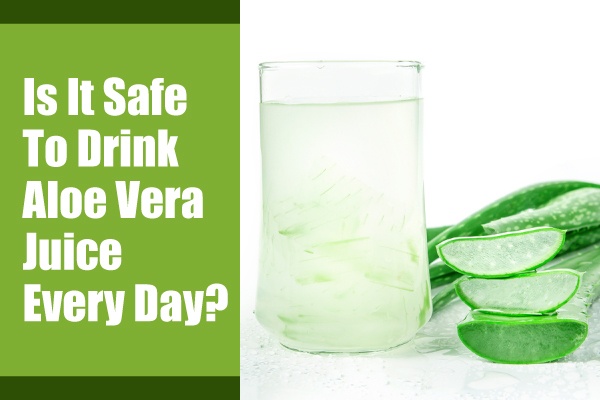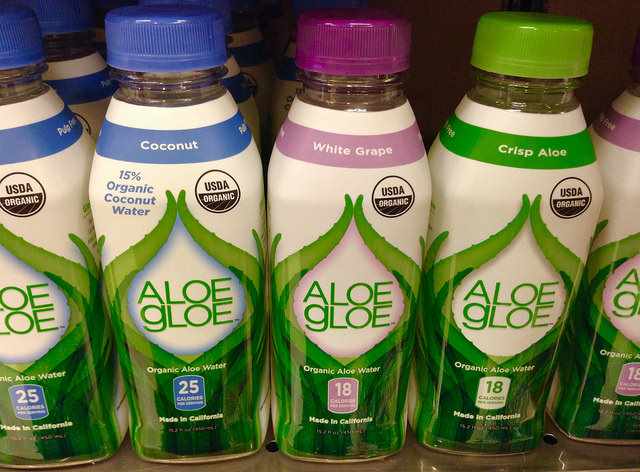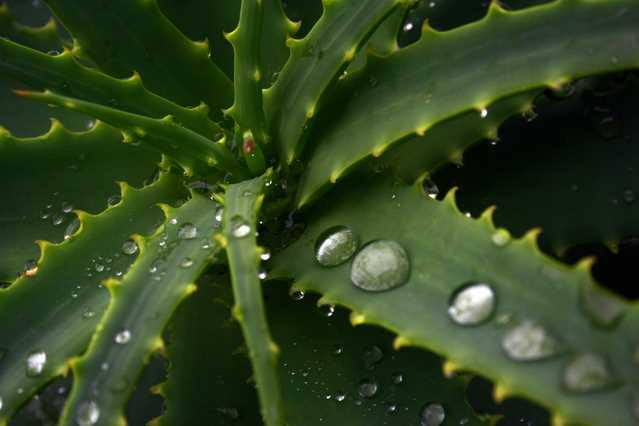Is It Safe To Drink Aloe Vera Juice Every Day?

Aloe vera juice is one of the hottest health trends out there today. Aloe vera itself has been used medicinally by humans for over 5000 years. Going as far back to the ancient Egyptians, the aloe vera cactus has been thought of as beneficial.
But modern analyses of the aloe vera plant have been more nuanced. Prior understandings have been overturned. Old therapeutic areas have been rejected as bunk, whereas new ones have been broached.
Is it safe to use aloe vera juice? In this article, we’ll break down everything you need to know about aloe vera drinks.
What Can Aloe Vera Do?
Aloe vera has a number of purported properties. These properties include modulating the immune system, reducing inflammation, altering the gut microbiome, helping with weight loss, treating psoriasis, moisturizing skin, helping with constipation, and providing nutrients.
Of these alleged properties, few are truly 100% false. But the context of providing the alleged benefits are often deceptive. For instance, aloe vera definitely provides moisturization – but only when applied topically, not when drunk.
Likewise, aloe vera has been shown to reduce inflammation in some contexts – when injected directly into an arthritic limb. When drunk, there are other anti-inflammation benefits – but they haven’t been proven in a large, randomized controlled trial that is methodologically sound.
Aloe vera has also been linked to improving wound healing, treating ulcers, and helping with ulcerative colitis. Many people use aloe vera topically to treat burns. They find that the cooling tingle of the aloe vera is soothing. It’s no secret that the cooling effect of aloe is real. But that might not carry over to an aloe drink.
When it comes to an aloe vera drink, you can only rely on a few things. First, it’ll cause increased gut motility. For most people, this results in stomach cramping and diarrhea if they take too much aloe vera drink.
Second, drinking aloe vera prepared in the wrong way can cause intestinal cancer. We’ll get into how that happens in the next section.

What Makes Aloe Vera Drinks Different?
Aloe vera drinks don’t play by the same rules as topically applied aloe vera. Aloe vera drinks have a few potential sources. The first is gel, which is the gelatinous interior flesh of the cactus. Aloe vera gel is the more common source of drinks.
The idea is that the aloe vera gel is diluted with another liquid to make a drink. Usually, the gel undergoes a chemical process called decolorization beforehand.
Decolorization removes the chemical aloin from the aloe vera; aloin should be removed because it’s thought to be responsible for the carcinogenic effects of consuming aloe vera. So, in theory, vera drinks which are made from decolorized vera gel should be safer than those who have not.
It is also possible to make aloe vera drinks from the latex of the plant, however. The latex of the plant is extruded through the flesh when it is nicked from the outside. The latex does include most of the compounds from raw aloe gel, but it also includes other compounds.
These other compounds are dangerous. The FDA banned all products containing latex of the plant from supplements claiming to prevent diarrhea. This means that you need to verify your drink is not made from the latex of the vera plant.
Without the latex portion of the plant, aloe vera drinks should still be a powerful laxative, and it’ll be much safer according to what we know. But we don’t really know all that much about how aloe vera impacts the body in the language of modern science – most of what we do know is too limited to draw strong conclusions.
What About For Pregnant Women?
Because aloe isn’t medicine but rather a plant, it doesn’t have a pregnancy category as assigned to many drugs or supplements. This likely means that no study assessing its safety or lack thereof has been performed.
Caution is the best approach when it comes to drinking aloe vera during pregnancy. There is not any evidence that aloe vera can cross the blood-brain barrier, nor any evidence that it cannot.
This means that there is not a good comparison to draw when speculating about whether compounds from aloe vera might cross the placental barrier between mother and child. It is impossible to say whether a mother consuming aloe will pass any of it on to her unborn child.
WebMD suggests that pregnant women abstain from consuming aloe in any format other than topically.

Is Aloe Vera Juice Safe To Drink While Breastfeeding?
Given the prior information, the question of whether aloe is passed from a mother’s milk to an infant is also difficult to answer. There is no data on the subject. Likewise, there is no data on the subject of whether aloe drinks are safe for newborns to consume.
Unlike during pregnancy, the risks of aloe vera crossing from the mother’s milk to the child are substantially lower, however. In order for any aloe compounds to make it to the mother’s milk, they would have to make it through the mother’s metabolism without being extremely degraded.
We know that aloe compounds resist degradation in the first-pass metabolism and stomach at least partially because of their impact on the intestines. In the intestines, aloe compounds cause a massive increase in gut motility and also a decrease in the amount of water that the intestines absorb.
These compounds could thus potentially make their way to the infant via the mother’s milk in small quantities. Once again, nothing is known about the topic specifically. Therefore, it is suggested not to consume aloe vera products while breastfeeding.
Are There Any Known Side Effects?
Aloe vera drinks have an array of side effects which can vary in intensity from drink to drink and from person to person.
Provided that the drinks are made properly by being decolorized, there are still some concerns. As stated previously, aloe drinks can cause diarrhea. It’s important to remember that even if a drink is a helpful digestive aid, getting diarrhea is a matter of drinking too much.
Furthermore, the immune modulation properties which aloe vera has can be a problem. While some people might find that an aloe vera drink helps them to manage their inflammation, others might find that it prevents them from fighting off infections.
There isn’t a way of knowing which outcome you will have until you drink the aloe. For people who are already immunocompromised, avoiding aloe drinks is a good idea. For those with autoimmune diseases, aloe is a gamble.
There is a small amount of evidence which suggests aloe vera drinks might be helpful for people with psoriasis in some situations. But the clinical efficacy is lacking. The evidence that there is was not derived from a large and randomized controlled clinical trial, so it does not meet the gold standard for treatments.
Worse, it could allow for certain festering gut microbiota to spiral out of control if the body’s beneficial gut bacteria are displaced by the effects of aloe. The impact of this would be lower nutrient absorption and more digestive difficulties. The anti-microbial properties of aloe are not always a good thing.

Even the nutrients contained in aloe vera drinks may not be as appealing to consume as you might think. The vera forms tiny knots while it is digested owing to its gelatinous properties. This prevents many of the nutrients within vera from making it into where the body needs them.
Other nutrients in the digestive tract at the same time as the aloe may also get sucked into the gelatinous bubbles and subsequently denied to the body. It’s hard to tell whether this happens, but it is at least plausible. The side effect would only be malnutrition in very serious cases.
Troublingly, aloe vera drinks have also been linked to a smattering of blood disorders. These disorders range from anemia to disrupted electrolyte balance. Importantly, these were transient, and not as dangerous as the full-on diseases named after these conditions might be.
So, if you are in the minority of people who experienced these symptoms, they would reside after you stopped drinking aloe. In the meantime, you might notice getting fatigued more easily or having your muscles spasm uncomfortably. Stop using aloe vera if you feel these effects.
Last but not least, aloe prepared incorrectly carries a risk of colon cancer. Even when prepared correctly, this risk remains, but it is very much reduced. The state of California considers aloe vera a carcinogen when consumed in liquid format.
Remember to place this side effect in context. Sunlight is the only known carcinogen to also carry beneficial effects for all people.
But there are many other carcinogens which are used medically because they provide beneficial effects for a certain group of people – chemotherapy drugs are one example out of many others.
If you derive palpable and large benefits from aloe vera drinks that you don’t get elsewhere, consider making a pragmatic medical decision about your use.
Should I Drink Aloe Vera Juice Daily?
Despite all the potential side effects and contraindications, drinking aloe vera once in a while is not going to kill you, and it probably won’t harm you so long as you don’t drink too much. But is it safe to drink aloe vera more frequently than once in a while?
The short answer is that we don’t know enough to say either way. The longer answer requires looking at what the scientists have to say about the issue.

In a study performed on baby chickens, liquid aloe vera did not cause acute harm to the animals beyond impacting their digestion. None of the animals died or were harmed when they were first administered aloe vera liquid, even when they received massive quantities that a human would never consume.
But the results are more complicated than they might seem. Over the course of two weeks of receiving massive doses of aloe vera in liquid format, some of the animals did start to become less healthy.
Two of the animals eventually died. The researchers hypothesized that this death was caused by an inability of the animals to create new blood vessels.
So, if you consume vast amounts of liquid aloe vera and somehow refuse to stop even after experiencing violent diarrhea, your body may have its ability to create new blood vessels impaired. This could be fatal, assuming that the effect on chickens is the same as the effect that it would have on humans.
Importantly, the researchers had a second group of chickens which received far lower doses of aloe vera over the course of the study. These chickens were happy and healthy from start to finish. The takeaway lessons here are that taking far too much aloe vera for an extended period of time can harm you.
Taking small amounts consistently for a short period of time will probably not harm you enough to be noticeable. It isn’t exactly fair to draw comparisons between chickens and humans, but if you are overly cautious, you will probably not drink aloe vera every day.
Even if you are only drinking a small amount, it’s possible you are inhibiting new blood vessel formation very slightly. This won’t kill you, but it might lower the health of your bodily tissues if it goes on for a long enough time.
New blood vessels help to supply your tissues with oxygen, and when newly grown tissues can’t get new blood vessels to supply them, they tend to die off. For a weightlifter or fitness-oriented person, these impacts should be avoided because they will make improvement much harder.
Older people should abstain from drinking aloe vera every day because they need as many new blood vessels as possible to stave off stroke and also heart attack risk. Very young people also need the ability to produce blood vessels at full steam.
For everyone else, the picture is slightly different. You’ll probably be fine.

